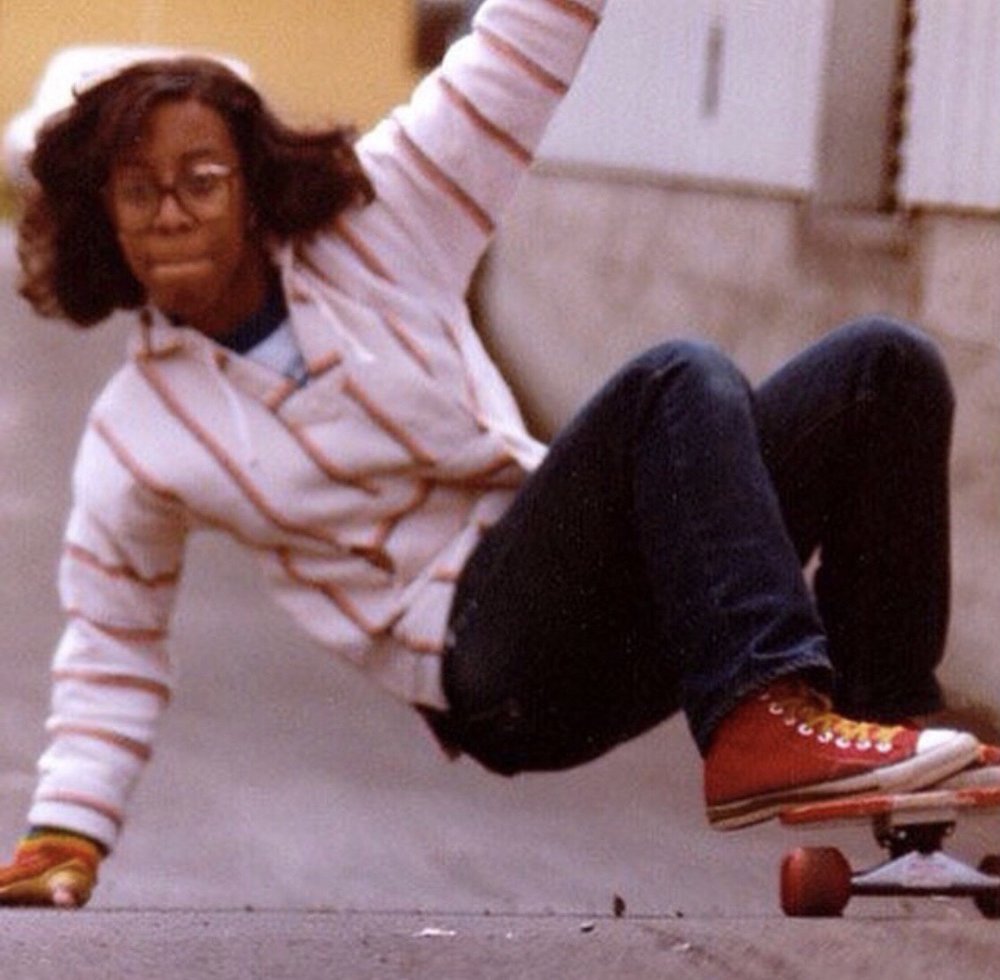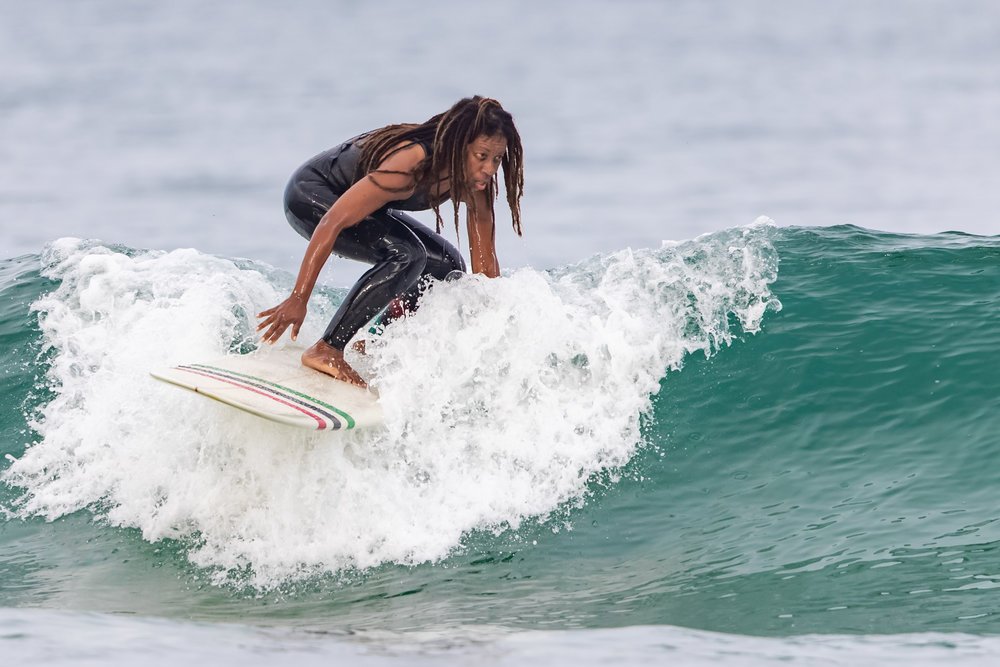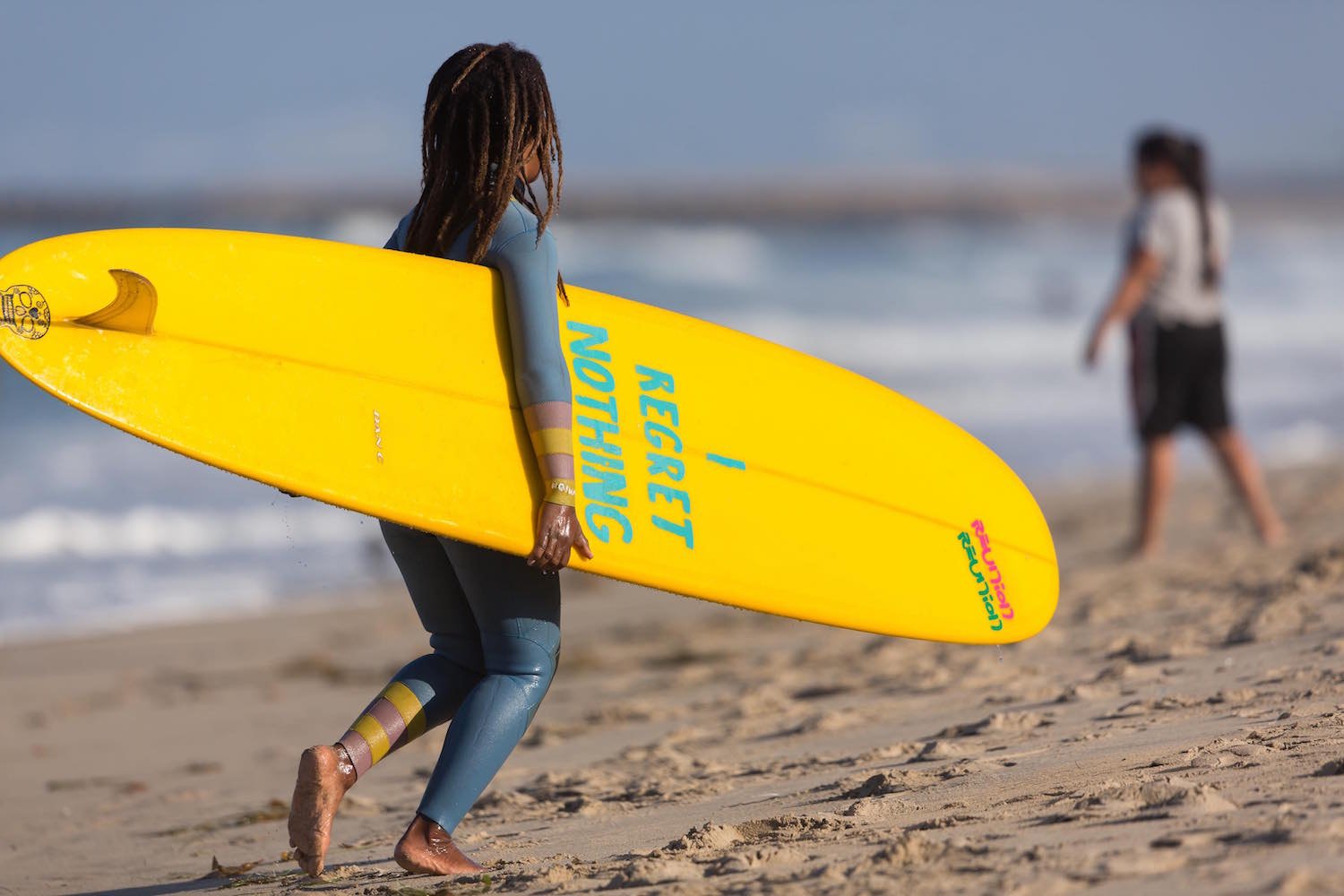Do You Know Mary Mills? Well You Should.
If you’re lucky, you’ve stumbled upon the badass photo of Mary Mills skateboarding circa 1983 or 1984-an iconic photo from the 80’s showing a hip African American woman doing a power slide on her skateboard. This woman is a role model for Textured Waves and as punk rock a they come. She is always going against the grain and doing her own thing. We caught up with Mary as she was taking down her skate ramp of eight years and got to chat with her a bit about hair, skating, and surfing.
Tell us a little about yourself. We've been following you for a little while on Instagram but we don't know a ton about you. How did you get involved in surfing?
I wanted to surf since I was a kid. I think I was a teenager, and you're too young to remember this show, but I used to watch Wide World of Sports on TV. I saw surfing on there and I thought, “I want to do that.” But there were a few things holding me back. Number one , I couldn't swim. Number two , I had straightened hair. And number, three I was a black kid. So I was like, “Well, I'll never do that.” Surfing never left me, although I think I was either 38 or 39 when I finally started. It was three months after I had my son, and he's 17 now. I'm 56 and fabulous by the way!
Yes you are fabulous!!!
Do you find that it is a trend of African American women who surf to start later in life?
I don't know that many black women that surf, but yes I think Andrea Kabwasa started in her 30's and Mimi Miller may have started in her 40's.
You are definitely one of our surf sheros here at Textured Waves. We know a little bit about the mysterious Andrea Kabwasa but were there any other African American females surfers when you first started surfing that we might not know about?
Yes there was one other that I can think of. Her name is Sharon Schaffer. I don't know if you've heard of her. She was actually a pro shortboarder. It was just the three of us that I consistently saw out there.
You three are some of the first documented African American female surfers, right? We can’t think of really anyone who comes before you guys. So in our minds you guys are like the Queens of African American female surfing.
Yeah, probably the first documented ones because of the internet. We are like the elders. Even though sometimes I think I can't be an elder, but then I catch myself because …yes I can.
You mentioned taking down your skate ramp today, do you still skate and when did you start skating?
I don’t skate anymore, because for one thing, I have a knee replacement and the turning and kick turns tend to irritate my knee. Also I don't want to fall. The water is forgiving, but ramps and wood, and all that… no…mm mm. I started skating as a kid, but I had to hide it. My parents wouldn't let me and all I wanted to do was skate. I would just read skateboard and surf magazines all the time. Of course when I was a kid I got accused of trying to be white.
Right, I think we’ve all been there, it's that old Oreo complex reference that people ignorantly use. You have been blogging about surfing since about 2005 and lack of representation in surf media. Do you think there has been much progress in terms of representation since you first started surfing?
Only because of social media, but I can’t really speak to surf media. When I first started, there was one women's surf magazine; I think it was called Surf Life for Women. But in general the surf magazines were then what they are today. They were mainly geared towards white guys. I can't really say that there has been much progress; I don't really look at surf magazines or surf websites anymore.
Where do you see skateboarding and surfing headed for women of color?
I’m seeing quite a few black women competitive and pro skaters on social media and there's Nique Miller and she's a professional stand up paddle boarder. In terms of the future, until black women deal with their hair, our hair, nothing will change. It's all about the hair. It's not about ability. It's about hair.
Photo by Mike Avalon
Photo by Dave Weldon
I'm so glad you mention hair, because Textured Waves was formulated partially around this idea of combating black women's attachment to hair and how that relates to involvement in outdoor activities and our relationship with the water. Much of what we see online regarding black women and hair, whether it's straightened or natural, is about taking selfies and preserving an unrealistic look.
I wanna ask you about your locs and how you decided to transition from straightening your hair to having locs and how being more involved in outdoor activities influenced that?
Well I have always been athletic. I joke that I came out of the womb running. My hair was a huge culprit in holding me back from participating in things like swimming, and just life in general. It wasn't until I was about 23 that I decided that I needed to learn how to swim. I really wanted to do a triathlon, and I just cut it off and sported a short Afro. Although my hair is really wavy so it didn't quite have that Afro shape. If I could grow a big bushy natural Afro like my son, I would have the biggest Afro right now. So it was at twenty-three when I cut my hair off, learned how to swim and never looked back. I made a commitment that I would never straighten my hair again. EVER.
The natural hair movement is kind of one of the catalysts for black women accepting ourselves and exploring things that previously held us back in regards to our hair. We are seeing more black women in the outdoors, swimming, surfing and doing things that have been deemed “untraditional”. Do you see those parallels too?
I do and it’s funny because you don't really see it that much in my generation, I can't believe I'm a part of a different generation! But when I cut all my hair off, it was different. It’s hard for me to look at society overall and say how people looked at me, because I've always been a lone wolf. I've always been kind of a weirdo and I've always done what I wanted to do.
Right! You’re punk rock and you were a skater and doing your own thing!
So how can we combat our issues with hair?
Here's my thing, and I haven't told a lot of people this but I look the way I look. I'm not ever going to be the prettiest woman in the room, I'm not ever going to be the one with the best figure, but I like who I am. I cannot reach this pinnacle of light skin, straight hair, make up and I don't want to do that. I am never going to be that, so I didn't even try. And I gave myself the freedom to just do what I want because all I wanted to do was go work out, and go outside and play! Even though I did get grief from people throughout my life about this, I just didn't care because I was doing what I wanted to do.
You seem to dabble in a few types of wave riding how has this been important for your connection to the ocean?
Truthfully, I was reading one day and I saw something about a surf mat and I was intrigued. I really wanted to try it. So I looked into it and now I'm riding surf mats and I do the Instagram for account 4th Gear Flyer, the guy who makes my mats. When the waves are terrible and I still want to get in the water, its fun to have a mat. About 95% of the time I ride longboards. There are days I look out there and don't feel like getting in the shore pound with my longboard, but I can take it on a mat! It's still a workout because you're working out your legs instead of your shoulders. So I'll just flop around and get a good laugh.
Your wetsuits seem to always be custom made. Why do you prefer custom suits? And who makes them for you?
I can't fit those little white girl suits off the rack. (Laughs) In fact, most white women can't wear them either. I don’t think the suits you find in shops use actual grown women as fit models. Those suits often don't take into account the various curves women have. I wear Reunion wetsuits and the guy who makes them is here in Orange County, but he's from Japan. So I tell him what I want and he goes to Japan, and brings back a bunch of wetsuits.
That so cool, it's kind of a rad way to maintain your individuality out there although it's kind of hard to get lost out there.
Here's the thing that I noticed once I started surfing: I don't blend in. As much as I want to, and as much as I have always been kind of shy and pretty reserved, I have found that people wouldn't really leave me alone when I was out there. They would always stare or want to come up and talk to me and say, “Hey, you're a black woman who surfs.” So then I thought, “What the hell! If I can't blend in I’m going to stand way out.” So if you're gonna stare at me, you’re going to think “Look at that wetsuit! Why is she on surf mat!?”
Photo by: Dave Weldon
Most recently you can be seen on an advertisement located on the BART and in bus stations across California. What is this ad for, how did you get involved?
I’m not even sure how they found me but it's for the California Coastal Commission. They just asked if they could take my picture and told me that it would appear in advertisements around tax season to ask people to donate to help protect the coastline. It is also about representation. When I have a chance to represent, even though I prefer to be anonymous, I usually try and step up.
One of the questions that the California Coastal Commission asked me for the ad was how would you like us to describe you? Each person in the ad gave some descriptors and one of the things I said was put “stereotype buster” and they kinda laughed at me. But they ended up using it.
You definitely are!
We respect that the elders, for the most part like to remain anonymous. Just because you surf doesn't mean you're required to be an advocate. But your voices are greatly appreciated by the younger generation and especially the women of color that surf; because we are looking for those role models. I personally have always been looking for that. Someone who looks like my mother, aunties, or sisters that surfs.
Surfing is my time, but what I will do is show up so people can see me, and if they need to take my picture that’s fine. I have allowed myself to be present because like I always tell folks, I don’t want anyone to ever say that black people didn’t surf.





